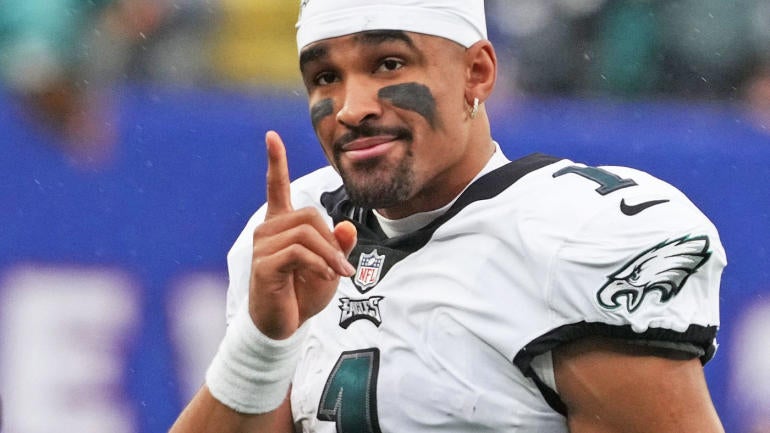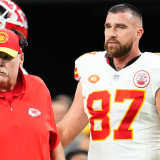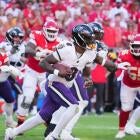Agent's Take: 2023 Super Bowl tale of financial tape for Chiefs vs. Eagles
A big disparity exists between the two Super Bowl 57 teams in how money was allocated for their star QBs

Championship-caliber rosters can be built under the salary cap in a variety ways. A specific blueprint for getting to the Super Bowl doesn't exist.
The Super Bowl LVII participants, the Chiefs and Eagles, provide a sharp contrast how financial resources can be allocated. Kansas City has gotten to the Super Bowl with a high-priced quarterback. Philadelphia has a low-cost quarterback on a rookie contract.
The following chart outlines the salary cap charges for the Chiefs' and Eagles' key contributors throughout the season at each position and on special teams. That's 32 players for the Chiefs and 31 for the Eagles. The Chiefs have 16 players on each side of the ball while the Eagles have 14 on offense and 17 on defense.
Dead money, a salary cap charge for a player no longer on a team's roster, is tracked as well. The NFL Collective Bargaining Agreement's $295 daily amount for participating in a team's voluntary offseason workout program is included in the cap numbers.
Financial tale of the tape
| | CHIEFS | EAGLES |
QB | $35,793,381 | $1,651,195 |
RB | $4,735,129 | $4,388,009 |
WR | $11,564,058 | $11,214,188 |
TE | $9,357,051 | $4,570,162 |
OL | $28,151,566 | $29,301,283 |
EDGE | $19,503,920 | $16,921,136 |
IDL | $33,402,751 | $42,768,891 |
LB | $2,556,391 | $3,037,965 |
CB | $5,209,169 | $14,560,476 |
S | $8,758,769 | $4,221,851 |
ST | $4,927,905 | $5,349,000 |
Dead money | $15,160,205 | $32,444,333 |
The NFL salary cap is currently $208.2 million. Each team's actual salary cap (known as adjusted salary cap) is typically different from the NFL's set amount because unused cap room can be carried over from one year to the next year and other adjustments can further increase or decrease cap space.
The league-wide average is $213,468,969, according to NFLPA data. The Chiefs are in the NFL's bottom third for adjusted salary cap at $210,680,092. The Jaguars are the only team with a larger adjusted salary cap than the Eagles' $225,257,793. It's a function of the Eagles carrying over the second most cap room, $16,481,403, from the 2021 league year.
Kansas City's key contributor cap spending skews heavily to the offense. It's just over $89.601 million offensively to $69.431 million defensively. The difference can partially be attributed to having 10 key defensive contributors on rookie contracts. The Eagles are the opposite with significantly more of the cap devoted to defense. The distribution is just under $51.825 million on offense and a little more than $81.5 million for the defense.
Dead money
Dead money exists because of how salary cap accounting rules operate. Signing bonuses, option bonuses and certain roster bonuses are prorated or spread out evenly over the life of a contract for a maximum of five years. When a player is released, traded or retires, the remaining proration of these salary components immediately accelerate onto his team's current salary cap.
There are two major exceptions to this general rule of bonus proration accelerating. Only the current year's proration counts toward the salary cap with transactions occurring after June 1. The bonus proration in future contract years is delayed until the next league year beginning in the following March. A team can also release two players each league year prior to June 2 (known as a post-June 1 designation) that will be treated under the salary cap as if they were released after June 1. With a post-June 1 designation, a team is required to carry the player's full cap number until June 2 even though he is no longer a part of the roster. The player's salary comes off the books at that time unless it is guaranteed.
This means dead money is typically a sunk cost where money isn't owed to a player. Only if there are salary guarantees when a player is released will there be a payment associated with dead money.
A strict definition of dead money is being used. Any player who is still under contract, including practice squad members, and those whose contracts voided and subsequently re-signed are not in the calculations. For example, the Eagles have a $12,826,820 cap charge for using a post-June 1 designation on defensive tackle Fletcher Cox. The $12,826,820 is part of Cox's total cap charge because he was re-signed to a more cap friendly contract a couple of weeks.
The Eagles are better able to accommodate dead money than the Chiefs because of a high adjusted salary cap. The Chiefs only have one dead money charge over $2 million. That's $4,223,750 from releasing linebacker Anthony Hitchens last February.
The Eagles have four dead money charges over $3.5 million. Defensive tackle Malik Jackson and wide receiver Alshon Jeffery, who were released with post-June 1 designations in 2021, account for $9.033 million and $5,435,706 of the dead money, respectively. The Eagles carried offensive guard Brandon Brooks on the roster until June 3 after he retired last offseason, so his $15,736,472 of dead money could split into $5,939,235 in 2022 and $9,797,237 in 2023. There's $3.548 million from trading tight end Zach Ertz to the Cardinals during the early part of the 2021 season.
Offense
Quarterback
Kansas City's roster building was infinitely more challenging because 2022 NFL MVP Patrick Mahomes has the league's second-largest cap number at $35,793,381. Philadelphia is a beneficiary of having a high-caliber quarterback on a rookie contract, which is the most valuable commodity in the NFL because of the roster flexibility it can provide. Jalen Hurts' $1,651,195 cap number isn't the biggest for a quarterback on the Eagles. Backup Gardner Minshew has a $2,547,965 cap number. Mahomes' cap number accounts for almost 17% of Kansas City's adjusted salary cap while Hurts takes up only 0.73% of Philadelphia's.
Running back
Neither team is making much of an investment at running back. Miles Sanders, an Eagles 2019 second-round pick, has a $1,713,493 cap figure. He has been a great value given his production. Sanders had career highs of 1,269 rushing yards and 11 rushing touchdowns and earned Pro Bowl honors for the first time this season. Isiah Pacheco ($727,145 cap number), a 2022 seventh-round pick, emerged as Kansas City's primary ball-carrier even before a high ankle sprain in Week 11 shelved 2020 first-round pick Clyde Edwards-Helaire ($2,960,484 cap number), who was just activated off injured reserve.
Wide receiver
The teams are taking different approaches to wide receiver despite having comparable collective cap charges. Signability led to Tyreek Hill's exit from the Chiefs. He was dealt to the Dolphins for five draft picks last March: 2022 first-, second- and fourth-round picks in addition to 2023 fourth- and sixth-round picks. The Chiefs picked up $18.035 million of 2022 cap space by trading Hill. Hill was given a four-year, $120 million contract extension, which has $72.2 million in guarantees, by Miami with $52.535 million fully guaranteed at signing.
Marquez Valdes-Scantling signed a three-year, $30 million deal, averaging $10 million per year with $15 million of guarantees, in last year's free agency. Incentives make the maximum value $36 million ($12 million per year).
JuJu Smith-Schuster came aboard on a one-year "prove-it deal" for $3.25 million that's worth up to $10.75 million through incentives. The Chiefs subsequently modified his contract so he could earn an additional $510,000 because his $510,000 of per game roster bonuses ($30,000 for each game active) were increased to $1.02 million ($60,000 for each game active).
Smith-Schuster earned the entire $3 million of incentives based on his receptions and receiving yards once he hit the 65-catch and 900-yard marks. He caught 78 passes for 933 yards. An additional $1.5 million was earned because Smith-Schuster's offensive playtime during the regular season was at least 65% and Kansas City made the playoffs.
Smith-Schuster's knee injury in the AFC Championship Game cost him a $1 million incentive. To qualify, he needed at least 50% playtime in the game as well as a minimum of 65 catches and 900 yards in the regular season. Smith-Schuster's playtime was 45%. He still has a chance at another $1 million with a Super Bowl win and those same requirements.
The Eagles found a top-flight receiving threat for Hurts. A.J. Brown was acquired from the Titans during the first round of the 2022 NFL Draft for 2022 first-round and third-round picks. Brown was rewarded with a four-year, $100 million extension containing slightly more than $57 million of guarantees in connection with the trade.
Tight end
Both teams have tight ends near the top of the market. Travis Kelce ($8,444,166 cap number) and Dallas Goedert ($3,729,697 cap number) are respectively the NFL's third- and fourth-highest-paid tight ends at $14,312,500 and $14.25 million per year. Goedert's cap number is low because his contract was structured with a signing bonus and two option bonuses. An option bonus is prorated on the salary cap over the life of a contract for a maximum of five years, just like a signing bonus. Goedert's cap numbers don't take a big jump until 2024 because of this contract structure when he's counting at $19,520,372 on Philadelphia's books.
Offensive line
Both teams have prioritized the offensive line. The Chiefs have a mix of players on both veteran and rookie contracts while the Eagles rely heavily on the former. Orlando Brown has been playing on a $16.662 million franchise tag. He rejected a reported six-year, $139 million deal with a $30.25 million signing bonus that was heavily backloaded. The deal was also too long for a 26-year-old Pro Bowl-caliber left tackle to accept. Cosmetically, Brown would have become the NFL's highest-paid offensive lineman at $23,166,667 per year because of a highly inflated last year of the contract. The deal was really $95 million for five years since there was a $44 million salary in 2027 that Brown would never see.
Joe Thuney became the NFL's highest-paid offensive guard when the Chiefs signed him to a five-year, $80 million contract containing $46.89 million of guarantees in 2021 free agency. Kansas City hit home runs in the 2021 draft with center Creed Humphrey ($1,274,260 cap number), a second-round pick, and right guard Trey Smith ($867,116 cap number), a sixth-round pick.
The Eagles are one of the NFL's most proactive teams in locking up core players well in advance of free agency. Executive vice president/general manager Howie Roseman has continued the practice that former longtime Eagles president Joe Banner started.
The Eagles got ahead of the curve with Jordan Mailata's contract extension in 2021. Mailata, a rugby player who had never played American football when taken in 2018's seventh round, was signed to a four-year, $64 million extension (worth up to $80 million through salary escalators) with $40.85 million of guarantees. The deal came shortly after Mailata beat out 2019 first-round pick Andre Dillard at left tackle to become a full-time starter for the first time.
Lane Johnson is arguably the best right tackle in football. The $18 million-per-year extension he signed during the middle of the 2019 season put him at the top of the offensive lineman pay scale.
Defense
Edge rusher
Philadelphia's ferocious pass rush is headlined by Haason Reddick, whose career-high 16 sacks were tied for second-most in the NFL. He signed a three-year, $45 million contract (worth up to $46.5 million through incentives and salary escalators) with $30 million fully guaranteed last March as an unrestricted free agent. Reddick's cap number is only $3.878 million because two voiding/dummy years were tacked on the deal so the signing bonus could be prorated over five years instead of three. Roseman likes to "cheat" the salary cap by frequently using voiding/dummy years in veteran contracts.
Philadelphia's largest cap charge comes from Brandon Graham, who essentially has been a situational pass rusher this season. His $9.413 million cap number is the fifth largest on the team.
Frank Clark originally had a $26.3 million 2022 cap number. He was scheduled to make $19.5 million in 2022 before decreasing his pay to $6.75 million with an additional $7 million in incentives in order to stay in Kansas City. His cap number dropped to $13,361,111, which is Kansas City's fourth largest, with the pay cut.
Interior defensive line
Both teams have devoted substantial resources to the interior of their defensive line. Philadelphia's are more because of a deep rotation of players.
Javon Hargrave and Fletcher Cox have Philadelphia's two largest cap numbers at $17.802 million and $16,827,705, respectively.
The Eagles signed defensive tackles Linval Joseph and Ndamukong Suh to nearly identical incentive-laden contracts during the middle of the season. By being on the field for a minimum of 30% of Philadelphia's defensive snaps over the last eight regular-season games, $125,000 is made for each playoff win while on the 53-man roster. Joseph and Suh's respective playtime for the eight games was 38% and 35.4%. The most the two players can make is $375,000 each because the Eagles had a wild card bye.
Chris Jones is responsible for the bulk of Kansas City's cap charges. He has the league's fifth-highest cap number for this season at $29,415,666. The 2023 season represents the last of the four-year, $80 million deal (worth up to $84 million through incentives) with $60 million of guarantees Jones signed in 2020 as a franchise player. Jones will have leverage in any contract-extension discussion because he had the best season of an interior defensive lineman and placing a $33.6 million franchise tag on him in 2024 will be too cost-prohibitive.
Linebacker
There is a nominal investment in linebacker with both teams. The largest cap charge among the four principal players is Kyzir White's $1,835,965. T.J. Edwards, Philadelphia's every-down linebacker, has a $1.202 million cap number. He signed a one-year extension for $2.15 million (worth up to $3.2 million through incentives), which had a $1.135 million signing bonus, during the middle of the 2021 season when he was headed toward restricted free agency. Kansas City's duo Nick Bolton, a 2021 second-round pick, and Willie Gay, a 2020 second-round pick, count $1,335,358 and $1,221,033, respectively, against the cap.
Cornerback
Kansas City went with a youth movement at cornerback. Charvarius Ward left for the 49ers last March in free agency on a three-year, $40.5 million contract (worth up to $42 million through incentives) with $26.62 million of guarantees.
All three Kansas City cornerbacks: Trent McDuffie ($2,546,456 cap number); L'Jarius Sneed ($1,060,070 cap number); Jaylen Watson ($728,710 cap number) are on rookie contracts. The 2022 first- and fourth-round picks obtained for Hill were packaged to the Patriots to move up from 29th to 21st in the first round to select McDuffie.
The Eagles arguably have the NFL's best cornerback tandem in Darius Slay and James Bradberry. Slay, who signed a three-year extension, averaging $16,683,333 per year in connection with his trade from the Lions in 2020, has Philadelphia's fourth-largest cap hit at $9.731 million.
Bradberry came to the Eagles on a one-year, $7.25 million contract (worth a maximum of $10 million through incentives) after the Giants made him a salary cap casualty last May. His 2022 cap number is only $2,281,245 because four voiding/dummy years were included in his contract.
Safety
The only key player on a veteran contract is Justin Reid. Kansas City signed Reid to a three-year, $31.5 million deal with $20.485 million fully guaranteed as an unrestricted free agent last March to essentially replace three-time All-Pro Tyrann Mathieu, whose contract expired after the 2021 season. Juan Thornhill, Reid's running mate, has the second-biggest cap charge of the foursome at $3,143,284.
Reid's $4.55 million cap number is more than the combined cap charges for Eagles safeties. The Saints dealt Chauncey Gardner-Johnson ($2.54 million cap number) to the Eagles late in the preseason after reaching an impasse in negotiations for a contract extension. The Saints were reportedly offering $8 million per year while Gardner-Johnson was seeking $12 million per year.
Special teams
The special teams cap expenditures are relatively even. Both kickers, Harrison Butker (Chiefs) and Jake Elliott (Eagles), are on deals averaging slightly more than $4 million per year .
Chiefs punter Tommy Townsend, a 2020 undrafted free agent, is a tremendous bargain. He is wrapping up a three-year deal worth $2,292,500. Townsend earned Pro Bowl and All-Pro honors this season. He had an NFL-best 45.6-yard net punting average.
Townsend will be a restricted free agent. The Chiefs have to decide whether to give Townsend the lowest tender for $2.627 million or the second-round tender for $4.304 million. The lower tender only provides the Chiefs the right to match an offer sheet from another team. A second-round pick is the compensation for an unmatched offer sheet with the higher tender.

















